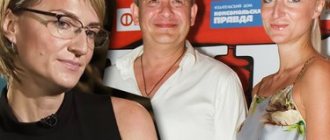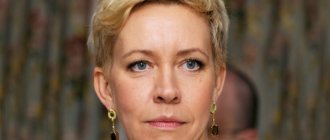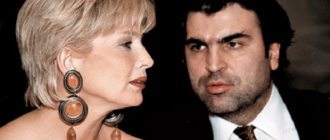Biography
“In order to understand how the world works, you need to know how the brain works.” Tatyana Vladimirovna Chernigovskaya, a world-famous scientist and professor of the Department of Linguistics, Faculty of Philology, St. Petersburg State University, is sure of this.
Tatyana Chernigovskaya was born in February 1947 in St. Petersburg into an intelligent family, where both parents are scientists. The constant example of service to science demonstrated by dad and mom, as well as studying in the only school in the USSR where teaching was in English, determined the daughter’s future.
Scientist Tatyana Chernigovskaya
After graduating from school, Tatyana Chernigovskaya entered the local university (SPGU), choosing the faculty of English philology. Here the student studied at the Department of Experimental Phonetics. According to Tatyana Vladimirovna, the woman never planned or predicted her own future. She often acted impulsively, as they say, at the call of her soul. Therefore, having received a humanities education, Chernigovskaya went into biology. Until the end of the 90s she worked at the Institute of Evolutionary Physiology and Biochemistry.
Carpal (carpal) tunnel syndrome (CARPAL TUNNEL)
Numerous studies show that smartphone use has negative effects on a person's hands, especially the median nerve. Let us recall that it is responsible for the sensitivity and functioning of the palm and fingers, with the exception of the little finger, and also innervates the muscles of the thumb. Disruption of the median nerve leads to carpal (carpal) tunnel syndrome.
Carpal tunnel syndrome occurs due to increased pressure on the median nerve in the carpal tunnel where it passes through. The main manifestations of the disease are tingling, numbness and pain in the fingers, palms and forearms. By the way, the above symptoms negatively affect the duration and quality of sleep.
Taking measures to prevent carpal (carpal) tunnel syndrome will certainly be the best solution, since it will eliminate the need for surgical intervention and prevent the disease from becoming chronic.
Most often, the symptoms of carpal tunnel syndrome develop gradually, so when you notice the first signs, you should try to relieve pressure on the median nerve. If your job requires typing on a computer keyboard, then you need to reduce the pressure on the keys. It is also highly recommended to take breaks while working.
Unfortunately, the condition of the hand often worsens, requiring medical intervention, which includes non-surgical and surgical treatments.
Non-surgical treatment methods:
— Change the usual work practices that cause the disease. Change your mobile phone to a smartphone with a larger screen, change the way you type on the computer or the way you hold the mouse;
- Wear a special fixing bandage, especially at night, which will prevent the wrist from bending during sleep;
- Use non-steroidal anti-inflammatory drugs that simultaneously relieve pain and inflammation;
— Take a course of corticosteroid injections, which will reduce swelling and inflammation. They will relieve pain and eliminate pressure on the median nerve.
- Undergo physical therapy and do regular exercises to relieve pressure on the median nerve, as well as exercises to strengthen the wrist muscles.
Methods of surgical treatment:
- Endoscopic surgery to treat carpal tunnel syndrome, which will relieve pressure on the median nerve.
The science
In 1977, Tatyana Chernigovskaya defended her Ph.D. thesis, and in 1993, her doctorate. The topic of the dissertation is: “The evolution of linguistic and cognitive functions: physiological and neurolinguistic aspects.” Tatyana Vladimirovna is a doctor of two sciences - biological and philological. She has the title of professor.
Tatiana Chernigovskaya
The subject of Professor Chernigovskaya's study is extremely subtle and complex. In short, this is the human brain. And if a little broader, then this is psycho- and neurolinguistics. Tatyana Vladimirovna is sure that this subject cannot be studied qualitatively and deeply without mutual enrichment of different fields of science. If the brain is studied only from a medical perspective, then many interesting aspects will be lost from understanding the subject of study. Therefore, in order to deeply explore, according to the hero Leonid Bronevoy from “The Formula of Love,” such a “dark” object as the head, we need not only biology, but also linguistics, psychology, biology, medicine, chemistry and neuroscience.
In 2000, on the initiative and insistence of Tatyana Chernigovskaya, the first specialization in the country called “Psycholinguistics” was opened at the Department of General Linguistics at St. Petersburg State University. The first Russian masters began to be trained under this program.
Professor, Honored Scientist of the Russian Federation Tatyana Chernigovskaya
Today Tatyana Chernigovskaya teaches courses “Psycholinguistics”, “Neurolinguistics” and “Cognitive Processes and the Brain” for undergraduate and graduate students of the philological and medical faculties of St. Petersburg State University, the Faculty of Liberal Arts and Sciences, as well as for graduate students of the European University in St. Petersburg.
The scientific biography of Tatyana Chernigovskaya is a close and fruitful collaboration with a number of institutes of the Russian Academy of Sciences, as well as with universities in Europe and America. Tatyana Vladimirovna is a state scholarship holder of the President of Russia and Fulbright (international exchange program). She is also the head of the St. Petersburg School of Psycholinguistics.
The subjects studied by Professor Tatiana Chernigovskaya are extremely complex. These are the origin of language, its development and pathology, the theory of evolution and artificial intelligence. She has written more than 250 scientific papers on this interesting topic. They are published in both Russian and foreign publications.
Tatiana Chernigovskaya
Tatyana Vladimirovna has been repeatedly invited and continues to be invited as a lecturer at major universities in the USA and Europe.
Tatyana Vladimirovna’s lectures are available not only to students of specialized specialties. Tatyana Chernigovskaya also gives public lectures in the “Direct Speech” lecture hall.
Viewers were able to see and hear the famous scientist after a series of programs aired on the “Culture” channel. Tatyana Chernigovskaya hosted a series of popular science programs on the “Culture” channel: “Starry Sky of Thinking”, “Let’s Show a Mirror to Nature...”, “Meeting at the Top”, “Observer”, “Rules of Life” and others. Particularly rated were the cycles called “The Starry Sky of Thinking” and “Let’s Show a Mirror to Nature.”
Also particularly popular was the lecture “How to teach the brain to learn?”. With this material, Tatyana Chernigovskaya appeared on the air of the “Rules of Life” program, in the “Direct Speech” lecture, and also participated with her in a number of scientific and educational festivals.
Tatyana Chernigovskaya also appeared on the Petersburg - Channel Five TV channel, where she hosted the “Intelligence” section in the “Night” program. Subsequently, the section was transformed into a series of original programs “Night. Intelligence. Chernigovskaya".
A complete list of TV shows, lectures and interviews is posted on the official website of Tatyana Chernigovskaya. Attached to the list are links to videos of the scientist’s speeches, which were recorded and posted on the Internet.
In January 2010, a decree of the President of the Russian Federation was issued, by which Professor Tatyana Chernigovskaya was awarded the title “Honored Scientist of the Russian Federation.”
Monographs[ | ]
- · Chernigovskaya T.V. Cheshire smile of Schrödinger’s cat: language and consciousness / St. Petersburg State University. University, Fak. liberal arts and sciences. - M.: Languages of Slavic culture, 2013. - 447 p. (Reasonable behavior and language; Language and reasoning). ISBN 978-5-9551-0677-9 · Chernigovskaya T.V. Cheshire smile of Schrödinger’s cat: language and consciousness / St. Petersburg State University. University, Fak. liberal arts and sciences. — 2nd ed. - M.: Languages of Slavic culture, 2013. - 447 p. (Reasonable behavior and language; Language and reasoning). ISBN 978-5-94457-259-2: 600 copies. · Chernigovskaya T.V. (co-author). The gaze of Schrödinger's cat: Registration of eye movements in psycholinguistic research / St. Petersburg State University. University - 2nd ed. - St. Petersburg: St. Petersburg State University, 2020. - 228 p. ISBN 978-5-288-05929-2 2000 copies.
Personal life
Tatyana Chernigovskaya devoted a number of scientific works to the upbringing of bilingual children, the development of children’s cognitive skills and the rehabilitation of children with speech disorders, but the press knows nothing about Tatyana Vladimirovna’s own children. Journalists don’t even know whether the professor even has children and a husband.
Tatyana Vladimirovna Chernigovskaya loves to relax in the forest or on the ocean coast. Here Tatyana Vladimirovna finds herself in the environment where a woman is most comfortable. Tatyana Chernigovskaya also loves to observe the behavior of her own pet - a cat of the British breed. According to the owner, this creature understands a woman without words. They have a telepathic connection.
Scientist Tatyana Chernigovskaya
Tatyana Chernigovskaya admits with a smile that she is somewhat of a snob and an esthete. The woman reads books only in paper, not electronic versions. Tatyana Vladimirovna likes to hold it in her hands, feel the texture of the pages under her fingers and “inhale” the unique “book” aroma.
Tatyana Chernigovskaya’s personal life is, in addition to all of the above, listening to classical music and visiting the theater. The professor considers simple human joys, such as delicious food and good wine, to be the source of pleasure. And the woman is also sure that the scientist’s native era is the bygone 19th century.
Trigger Thumb Syndrome
Snapping finger syndrome is a painful pathology characterized by difficulty flexing the phalanges of the thumb or any other finger. With this disease, the finger gets stuck in a bent position and straightens with a characteristic click, as when pressing the trigger of a pistol. By the way, this clicking sound gives the name to the above-mentioned disease.
The scientific name of the syndrome is stenosing ligamentitis. The cause of this disease is considered to be improper use of one of the fingers. For example, the index finger when operating a computer mouse or typing on a computer keyboard. This leads to inflammation of the connective tissues and ligaments that hold the flexor tendons. When you try to straighten your finger, pain and a characteristic clicking sound appear. In addition, there is a “locking” of the finger in the extended state. Complications of stenosing ligamentitis may be accompanied by the appearance of a dense, painful lump at the base of the finger. If the condition worsens, the finger becomes stuck in a bent position.
Treatment of the disease:
- Give your hand a rest for a while;
— Use a special fixing bandage;
— Take non-steroidal anti-inflammatory drugs;
- Do regular finger stretching exercises;
- Take a course of corticosteroid injections as a local treatment;
- Use surgery as a last resort.
Tatyana Chernigovskaya now
In April 2020, television viewers had the opportunity to hear Tatyana Vladimirovna’s most interesting arguments in Vladimir Pozner’s popular program. The subject of conversation is the structure of our brain. In a conversation with the TV presenter, Tatyana Chernigovskaya touched on a number of questions that concern TV viewers: how the human brain functions, whether science will ever be able to thoroughly explain this, how the brain and personality interact, what is the superiority of the brain over the computer.
In 2020, Tatyana Chernigovskaya received another recognition of her own scientific activities. The Russian Academy of Sciences nominated Tatyana Vladimirovna for a Gold Medal for outstanding achievements in the field of dissemination of scientific knowledge. In the same year, Tatyana Chernigovskaya became the winner of the Gold Medal in the Life Science category.
SELFIE WRIST
The unbridled desire to take selfies negatively affects the hand's ability to hold things and also causes a neurological disease - carpal tunnel syndrome.
Symptoms of carpal tunnel syndrome occur in people 18 to 35 years of age as a result of compression of the median nerve as it passes through the carpal tunnel. This happens because when taking a selfie, you have to unnaturally twist your wrist to get the right angle for shooting.
Treatment of the disease:
— Do not press hard on the phone screen when using it;
— Do not use only one hand to operate your mobile phone, alternate them.
- Give your hands a rest from time to time;
- Do regular exercises to stretch your fingers and wrist muscles.
Awards and achievements
- 1977 – defended her Ph.D. thesis
- 1993 – defended her doctoral dissertation “Evolution of linguistic and cognitive functions: physiological and neurolinguistic aspects”
- 2000 - on the initiative and insistence of Tatyana Chernigovskaya, the first specialization in the country called “Psycholinguistics” was opened at the Department of General Linguistics of St. Petersburg State University
- 2006 - elected foreign member of the group of philosophy and philology of the section of humanities and social sciences of the Norwegian Academy of Sciences
- 2010 - by decree of the President of the Russian Federation, Tatyana Vladimirovna Chernigovskaya was awarded the honorary title “Honored Scientist of the Russian Federation”
- 2017 – laureate of the RAS Gold Medal for outstanding achievements in the field of dissemination of scientific knowledge in the “Life Sciences” category
Bibliography[ | ]
Member of the editorial boards of the Russian Academy of Sciences journals “Problems of Philosophy”, “Problems of Artificial Intelligence”, “Socio- and Psycholinguistic Research”, “Neurophilosophy”, “Man”, the journal STEPS/STEPS (journal of the School of Current Humanitarian Research, published by RANEPA), “The International Journal” of Cognitive Research in Science, Engineering and Education (IJCRSEE)", "The International Journal of Engineering, Management and Information Sciences (IJEMIS)", Word. RU: “Baltic Accent” (refereed publication of the Immanuel Kant Baltic Federal University).
"Cellphone Elbow" (CELLPHONE ELBOW)
Symptoms associated with cell phone elbow syndrome include numbness, tingling, or loss of sensation in the pinky and ring fingers due to pressure on the ulnar nerve, which runs through the cubital tunnel just behind the inside of the elbow. The scientific name of the disease is cubital tunnel syndrome. It occurs when a person leans on their elbow for a long time while using a mobile phone or computer.
Treatment of the disease:
Taking preventative measures is the best initial treatment to not only relieve pressure on the ulnar nerve, but also avoid surgery.
"Computer Neck Syndrome" (TEXT NECK)
“Computer Neck Syndrome” is not a medical term, but it has become widespread recently. He is credited with all the neck and shoulder pain caused by excessive use of mobile phones.
The average adult head weighs about 4.5 kilograms. We don't feel it because the neck was specially designed to support the weight of the head. But what happens when you hang your head over your mobile phone? The center of gravity shifts forward, which increases the load on the cervical spine. If previously the load on the cervical vertebrae was 4.5 kilograms, then when tilted, the weight of the head increases to 22 kilograms.
Can you imagine how many hours you spend staring at your mobile phone? Your neck is in an unnatural position for a long time, which leads to catastrophic consequences: from pain to displacement of the cervical vertebrae.
Symptoms associated with computer neck syndrome include persistent pain in the neck, shoulders and upper back, as well as cramps and limited movement of the cervical spine.
Treatment of the disease:
- Change your position when using computers and mobile phones. Rest from time to time and sit with your back straight;
- Do regular stretching and exercises to strengthen your neck muscles.
Don’t train your children only for the Unified State Exam
There is such a cartoon, it depicts animals that have to climb a tree: a monkey, a fish and an elephant. Various creatures, some of which, in principle, cannot climb a tree, however, this is exactly what the modern education system offers us in the form of the subject of our special pride, the Unified State Exam. I think this is very harmful. If, of course, we want to prepare people who will work on the assembly line for life, then this is certainly a suitable system. But then we must say: that’s it, we are putting an end to the development of our civilization. We will hold on to Venice as long as possible so that it doesn’t drown, but we don’t need anything new, there are already enough masterpieces, there’s nowhere to put them. But if we want to educate creators, then this system is the worst thing we could come up with.










